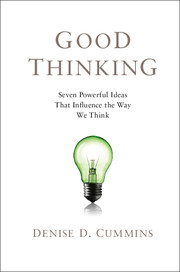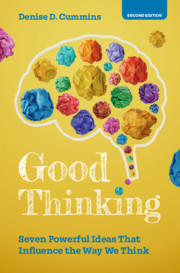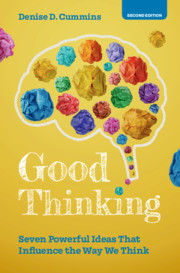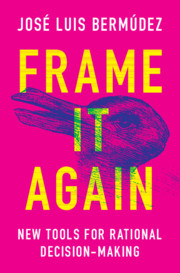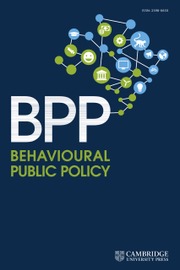Good Thinking
Do you know what economists mean when they refer to you as a “rational agent”? Or why a psychologist might label your idea a “creative insight”? Or how a philosopher could be logical but also passionate in persuading you to obey “moral imperatives”? Or why scientists disagree about the outcomes of experiments comparing drug treatments and disease risk factors? After reading this book, you will be wiser in two ways: You will know how the best and brightest thinkers judge the ways we decide, argue, solve problems, and tell right from wrong. But you will also understand why, when we don’t meet these standards, it is not always a bad thing. The answers are rooted in the way the human brain has been wired over evolutionary time to make us kinder and more generous than economists think we ought to be, and more resistant to change and persuasion than scientists and scholars think we ought to be.
- Evaluates the methods used to make decisions, solve problems and tell right from wrong
- Accessible to the general reader and useful for undergraduates in introductory seminars on thinking and deciding
- Argues that our brains have evolved to make us more generous than economists think we ought to be, and more resistant to change than scientists think is good for us
Reviews & endorsements
"Good Thinking will take you on a quick and engaging tour of the landscape of human thinking, surveying the phenomena that psychologists and philosophers have found there."
Keith Holyoak, Distinguished Professor of Psychology, University of California, Los Angeles
"Cummins provides an entertaining and accessible review of the classical theories of reasoning and decision making."
Dr Mike Oaksford, Birkbeck, University of London
"… a witty and articulate overview of critical aspects of human thought processes … The astute examples anchor the topics squarely in readers' everyday experience."
Dr Richard Gerrig, State University of New York, Stony Brook
"Good Thinking offers an engaging analysis of seven fundamental modes of human thought. Drawing expertly on a broad range of disciplines and examples from everyday life, Denise Cummins considers both the strengths and weaknesses of our mental machinery and in so doing illuminates key aspects of how we reason and decide."
Daniel L. Schacter, William R. Kenan, Jr Professor of Psychology, Harvard University, and author of The Seven Sins of Memory: How the Mind Forgets and Remembers
"… the book illuminates the strengths and the pitfalls of the ways people think; readers may be surprised at human cognitive fallibility … offers a compelling discussion of the current work in cognitive neuroscience that reveals the neural complexities of thought process … readers who choose to look at this interesting book will be making a good decision … Recommended …"
B. C. Beins, Choice
"…Good Thinking is cleverly written and well pitched to a college- or university-level audience of undergraduates who would benefit from an excellent survey of concepts and theories that are not likely to be seen elsewhere in a single collection, and it represents some of the more powerful ideas that our intellectual culture considers as the basis for rationality. Virtually every idea in Good Thinking can be gotten elsewhere either in its original form or as part of extended volumes on a specific topic, but having them tied together in a single book written by a single hand gives more life and cohesiveness to the ensemble than might otherwise be the case … a pleasant way to stimulate the appetite for more … For some time to come, Good Thinking will be a relevant and useful resource for educators as well as those who seek to reflect on our Western thought traditions and their origins."
Dr Donald MacGregor, Senior Research Scientist, Decision Science Research Institute, Eugene, Oregon
"Denise Dellarosa Cummins - philosopher and psychologist - explores the way experts across various fields argue and deal with very challenging issues that directly impact our lives … A very interesting book for philosophical practitioners, mainly due to the author's interdisciplinary approach and ability to summarize relevant outputs from both human and neurosciences."
Fernando Salvetti, Philosophical Practice: Journal of the APPA
Product details
May 2012Adobe eBook Reader
9781139415064
0 pages
0kg
1 b/w illus. 12 tables
This ISBN is for an eBook version which is distributed on our behalf by a third party.
Table of Contents
- 1. Introduction
- 2. Rational choice: choosing what is most likely to give you what you want
- 3. Game theory: when you're not the only one choosing
- 4. Moral decision-making: how we tell right from wrong
- 5. The game of logic
- 6. What causes what?
- 7. Hypothesis testing: truth and evidence
- 8. Problem solving: another way of getting what you want
- 9. Analogy: this is like that.

